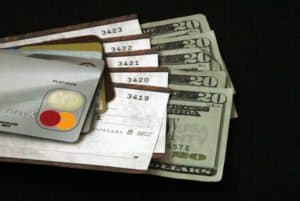There are certain guidelines for using personal credit cards for business. Do you know what they are and how to make your cards work for you? Keep on reading!
Our content reflects the editorial opinions of our experts. While our site makes money through
referral partnerships, we only partner with companies that meet our standards for quality, as outlined in our independent
rating and scoring system.
While using a business credit card to fund business-related purchases may seem like the obvious way to go, an SBA study on business financing found that a higher percentage of startups use personal credit cards to fund their operations (13%) than business credit cards (7%).
You can use a personal credit card for business expenses, but if you do, there are important steps you need to take to safeguard your finances. You also may be missing out on some serious rewards and perks by not choosing a business credit card.
We’ll dive into the advantages and disadvantages of using personal credit cards for business expenses. Then, we’ll discuss best practices to keep in mind when using personal credit cards for business, so that your business can be as successful as possible.
Can I Use A Personal Credit Card For Business Expenses?
Using a personal credit card is completely fine for business expenses. At the end of the day, personal and business credit cards perform the same function by making purchases on credit, so as long as you properly track your business expenses, using either a personal or business credit card to fund a business purchase is completely acceptable.
But just because you can use a personal credit card for business doesn’t mean you always should. While using a personal credit card for business can often be more convenient and can offer some APR perks, it makes bookkeeping much more difficult and you miss out on the liability protection and business-focused rewards that business credit cards offer.
So how do you know which option you should go with? Let’s dive into the details.
When Using A Personal Credit Card Is Better
As it happens, using personal credit cards for business can be actively beneficial in these three particular areas:
- APR Protection: The CARD Act of 2009 provides legal protections to users of personal credit cards that don’t apply to business credit card users when it comes to APR. When using a personal card, you can’t have your intro APR revoked before six months have passed, nor can you be charged excessive fees for minor infractions. You also can’t have your APR raised without 45 days prior notice. While business card issuers often extend these protections to consumers as a courtesy, this isn’t a universal practice.
- Easier To Qualify For: You may find personal credit cards easier to qualify for than business credit cards, especially if you haven’t established a business credit score yet or are just starting out and have minimal business history or revenue.
- Convenience: If you already have a personal credit card, it can be super convenient to just charge business expenses to it without going through the hassle of opening a new business credit card.
Despite these benefits, we still highly recommend that businesses open a separate business credit card — or at the very least open a personal credit card that is used only for business expenses.
The only time we could in good conscience make a case for using an existing credit card for business expenses is if you operate a very small business like a side hustle, freelance company, or hobby-turned-business where business expenses aren’t going to be a regular occurrence on your credit card statement. Ideally, you still want a separate personal credit card that is just for business expenses.
Why do we feel so strongly about this? Let’s dive into the benefits of using a business credit card.
When Using A Business Credit Card Is Better
It’s much easier to use a business credit card for business expenses and there are a ton of benefits, including:
- Better Rewards: Business credit cards offer better rewards that are designed specifically for businesses like welcome bonuses, rewards categories with high earning rates that match business spending, cash-back, business travel perks, business software discounts, and more.
- Business-Specific Features: Business credit cards come with many business-specific features like employee spend tracking, cash flow management, accounting integrations, and more.
- Liability Protection: Business credit cards have the potential to offer much more liability protection than personal credit cards because they are based on your business revenue and history, rather than being tied to your personal income. This protects you and your personal assets if your business should go under. Note that not all business credit cards offer the same level of liability, so you’ll need to read the fine print (or our credit card reviews) to know exactly how each card operates.
- Easier Bookkeeping: One of the biggest perks of business credit cards is that having a separate credit card for your business makes bookkeeping easier for you and your accountant (and the easier you can make your accountant’s life the less you owe them at tax season). Keeping your expenses organized also makes it easier to find the expenses that qualify as tax deductions and gives you a better understanding of your business’s spending habits and overall financial state.
- Employee Cards: If you intend to give employees their own credit cards, applying for a business credit card with free employee cards is a must. Personal credit cards aren’t as good when it comes to requesting and tracking additional cards, and giving employees any sort of access or control over your personal finances is a bad idea.
All of these factors play into why we recommend using a business credit card for business expenses.
The 5 Best Practices For Using Personal Credit Cards For Business
If you’ve decided to use a personal credit card for your business or have looked into business credit cards and don’t think you meet the eligibility requirements yet, here are our top tips on how to successfully use a personal credit card for business.
Use A Separate Card For Business
No matter how you fund your business, it’s important to avoid commingling business and personal expenses. A good way to keep things separate is to use a separate credit card for your business purchases, even if that card is a personal card. This way, you won’t have to go through your existing personal card’s purchase history line-by-line to determine which purchases were business-related and which weren’t.
Keeping your business purchases confined exclusively to one card is especially helpful at tax time. Limiting your business purchases to one separate card will make dealing with the IRS less painful in the event of an audit. If you charge business and personal expenses on the same card, you may have a harder time proving to the IRS that your business charges really were for business purposes.
Keep Your Credit Utilization Low
If you use a separate personal credit card for all your business-related expenses, know that you can negatively impact your personal credit score with your business purchases. To help alleviate the hit to your score, keep your credit utilization ratio — the amount of debt you have versus the amount of your credit limit — low. As we explain in our guide to improving your personal credit score, it is generally recommended that the amount of available credit you utilize is kept below 30%.
Note that regardless of whether you make personal or business purchases on your credit card, all debt owed on your credit card is treated the same when calculating the credit utilization ratio. As such, all purchases (business or personal) made on a personal credit card will affect your personal credit history’s credit utilization ratio.
Make Your Payments In A Timely Fashion
Of course, while you can hurt your personal credit score with a credit card, you can also boost your credit score by using your card wisely. The easiest way to help your score is by making payments on time. By consistently paying off your bill on time, you’ll be able to improve your credit by showing that you are a trustworthy credit borrower.
The fact that you can improve your personal credit score is actually another big plus to using a personal credit card for business purchases — creditors don’t typically report business credit card activity to consumer credit bureaus (read our guide on Equifax vs Experian vs Transunion). This also means that you should only place purchases on your credit card that you know you can pay off. It’s not worth being saddled with extra debt that can be subject to interest rates and could negatively impact your credit score.
Don’t Use Your Debit Card
Even if you don’t get a separate card for business use, whatever you do, don’t make business purchases on your debit card. Doing so is a good way to get a hold placed on your own money.
Entities such as hotels and rental car agencies will typically place a hold on your card — often for hundreds of dollars. In this way, business-related purchases can end up sapping your personal funds. Don’t do it!
Know When To Graduate To A Business Credit Card
As your business grows, you may find that a personal credit card won’t cut it. This is especially true if you eventually want to get employees their own credit cards. In this case, finding a business credit card could become the right option — many offer free employee cards that are easy to request and hand out.
Your business’s spending habits may change over time as well. If this happens, you might find that there is no personal credit card that offers the best rewards for your business. Instead, a business credit card with business-focused rewards may become a great choice. Learn more about how to get a business credit card.
Find The Right Credit Card For Your Business
Hopefully, we’ve put your mind at ease by establishing that it’s not illegal to use a personal credit card for business purposes.
Ultimately, the decision to use a personal or business credit card will depend on what your business needs a credit card for.
Both business and personal credit cards can be great options for many different kinds of businesses. To help your search, we recommend taking a look at some of the best business credit cards on the market today. If those cards don’t suit your needs, spend a little time reading our personal credit card reviews.












